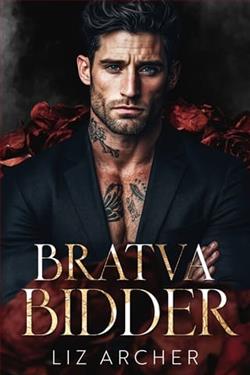Page 32 of Thawed Gladiator: Lucius
“Café du Monde is basically a religious experience for tourists,” I reply, taking a sip of my chicory coffee. “Though I can’t imagine Roman priests had to deal with this much powdered sugar on their robes.”
He smiles, a rare, full smile that transforms his solemn features. “The temples had their indulgences. During Saturnalia, even Pluto’s priests were permitted certain… liberties.”
My phone buzzes for the third time since our meeting. Another text from Norris. I ignore it, focusing instead on the man across from me, his pale features set against the vibrant backdrop of the French Quarter.
“Tell me about the temple,” I say, leaning forward. “Not the sanitized version for documentaries. The real experience.”
Lucius’s gaze turns distant, seeing across millennia rather than the busy café around us. “It was… everything to me. My earliest memories are of cool marble floors, the scent of sacred herbs burning in bronze braziers.” His fingertips drag faint, deliberate lines over the tabletop—like he’s redrawing the temple’s floor plan from memory. “I slept in a small chamber near the inner sanctum, where the senior priests conducted the most sacred rites.”
“Were you afraid? As a child in a death temple?”
“Fear comes from misunderstanding,” he replies, his voice softening. “Death wasn’t frightening in the temple—it was a transition to be respected, a journey to be guided. The living were far more unpredictable.”
A horse-drawn carriage clip-clops past our table, the driver calling out historical tidbits to tourists. On impulse, I grab Lucius’s hand. “Come on. We’re doing that next.”
His puzzled expression as I pay for our carriage ride makes me laugh again. “It’s traditional,” I explain, helping him climb aboard. “Ridiculously touristy, but the best way to see the city.”
We settle onto the worn leather seat, our shoulders touching. The solid warmth of his frame beside me makes me excruciatingly aware of every point where our bodies connect. Even through the fabric of his shirt, I can feel the heat of him, smell that distinctive scent that’s become as familiar as my own—herbal and clean with an underlying musk that’s purely male.
The driver begins his practiced patter about haunted mansions and yellow fever epidemics. Lucius listens with surprising interest, occasionally asking questions that make the driver pause his script.
“The miasma theory of disease,” Lucius murmurs to me as the driver describes quarantine measures. “Romans understood this concept as well—illness carried on foul air.”
The carriage turns onto a shaded avenue of grand homes, their balconies dripping with ferns and colorful bougainvillea. When the driver mentions a particularly famous ghost story, Lucius leans closer, his breath warm against my ear.
“There are no vengeful spirits here,” he whispers. “Only memories imprinted on the place. Your driver embellishes for effect.”
“How can you tell?” I whisper back, barely able to restrain myself from placing my hand on his muscular thigh.
“The same way your priests know whether consecrated ground truly holds blessing,” he answers cryptically. “Some things can be sensed by those trained to perceive them.”
As we disembark from the carriage, I spot a perfect backdrop for a quick segment—an ornate wrought-iron gate with the famous above-ground tombs visible beyond it.
“Would you mind if I record something quickly?” I ask Lucius. “Just a brief intro piece.”
He gestures permission, stepping away to examine a nearby historical marker while I set up my small camera on its portable tripod. The recording takes less than ten minutes—a concise explanation of how New Orleans’ unique burial practices developed from necessity but evolved into cultural tradition.
When I finish and pack away my equipment, Lucius rejoins me, curiosity evident in his expression.
“You’re different when you’re recording,” he observes. “More… constructed.”
“Professional persona,” I admit. “Five years of practice. Sometimes I wonder where Raven ends and Rosemary begins.”
He considers this thoughtfully. “Perhaps this journey will help you discover that boundary.”
A voodoo shop catches Lucius’s attention with its window display of ritual items.
Inside, shelves overflow with gris-gris bags, handmade dolls, and candles inscribed with prayers. The proprietor, a woman with at least eight facial piercings, short black polished nails, and penetrating eyes, watches us from behind a counter of herbs and potions.
“You two make an interesting pair,” she observes, her gaze lingering on Lucius longer than comfortable. “Come looking for protection? Or something else?”
“Just exploring,” I answer, though something in her assessment makes me feel unexpectedly exposed.
Lucius moves through the shop with reverence, examining ritual items with the careful consideration of a scholar. When he reaches a display of ceremonial knives, his fingers hover over a bone-handled blade without touching it.
“This blade,” he says in careful English, “it is for… sacred work? Not for hurt people?”
The shop owner approaches, her bracelets jingling softly. “You have a good eye. That one’s for ritual work—opening pathways, not spilling blood. Most people assume all blades are for sacrifice.” She studies him with growing interest. “You speak as someone who knows the old ways.”















